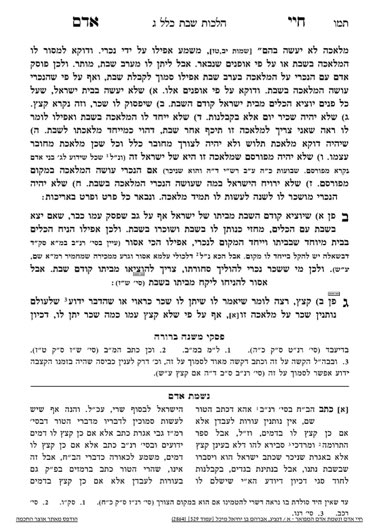We are continuing in siman 1, discussing the eight conditions which must be met to allow for a non-Jew to perform melacha for a Jew on Shabbos. Yesterday, we learned the first three:
- The work cannot be done in the home of any Jew, and any materials must be removed from the home of the Jew before Shabbos.
- The non-Jew must be paid
- The non-Jew must be a kablan.
Today, we will continue with the next three criteria:
- The Jew cannot directly or even indirectly imply that the melacha be done on Shabbos. For example, the Jew cannot drop off a car for work right before Shabbos and mention that they would appreciate driving out of town right after Shabbos. This is known as meyacheid melachto. The non-jew is therefore working on Shabbos at the behest of the Jew, and is considered his shliach.
- Even after taking care of the directive, Chazal were concerned for maris ayin. Therefore, they prohibited the non-Jew performing melacha on anything which is attached to the ground. Even if it is not on the Jew’s premises, given that it is attached to the ground, it has a certain degree of visibility over something done in a garage or basement. This concern for maris ayin is brought down in a Gemara in Avodah Zarah.
- It cannot be well-known that the work done is being done for the Jew. for example, if one gives their car to a non-Jewish mechanic in a permissible way, but their car has a big “bitachon” or “ein od milvado” bumper sticker on it, when the mechanic begins to work on the car, if the the auto garage is in a jewish neighborhod, it will be obvious they are working for a Jew. Thus, even if all of the other criteria have been met, it will still be problematic.
The Chayei Adam adds that in his opinion, “well-known” is defined as three Jews knowing. Thus, if the mechanic is in a non-Jewish neighborhood, it is muttar for the mechanic to work on the car over Shabbos even with something obvious such as a bumper sticker.
Summary
- Amira l’akum is the prohibition against instructing a non-Jew to perform melacha on Shabbos. Nevertheless, there are times when it will be muttar, dependent on eight conditions. The first six are:
- The work cannot be done in the home of any Jew, and any materials must be removed from the home of the Jew before Shabbos.
- The non-Jew must be paid
- The non-Jew must be a kablan
- The Jew cannot directly request that the work be done on shabbos. He may not even indirectly imply that the melacha be done on Shabbos by putting the non-Jew in a situation in which it is inevitable that they will have to work on Shabbos.
- The non-Jew cannot perform melacha on anything attached to the ground.
- It cannot be well-known that the non-Jew is performing melacha for the Jew. The Chayei Adam defines “well-known” as three Jews.



